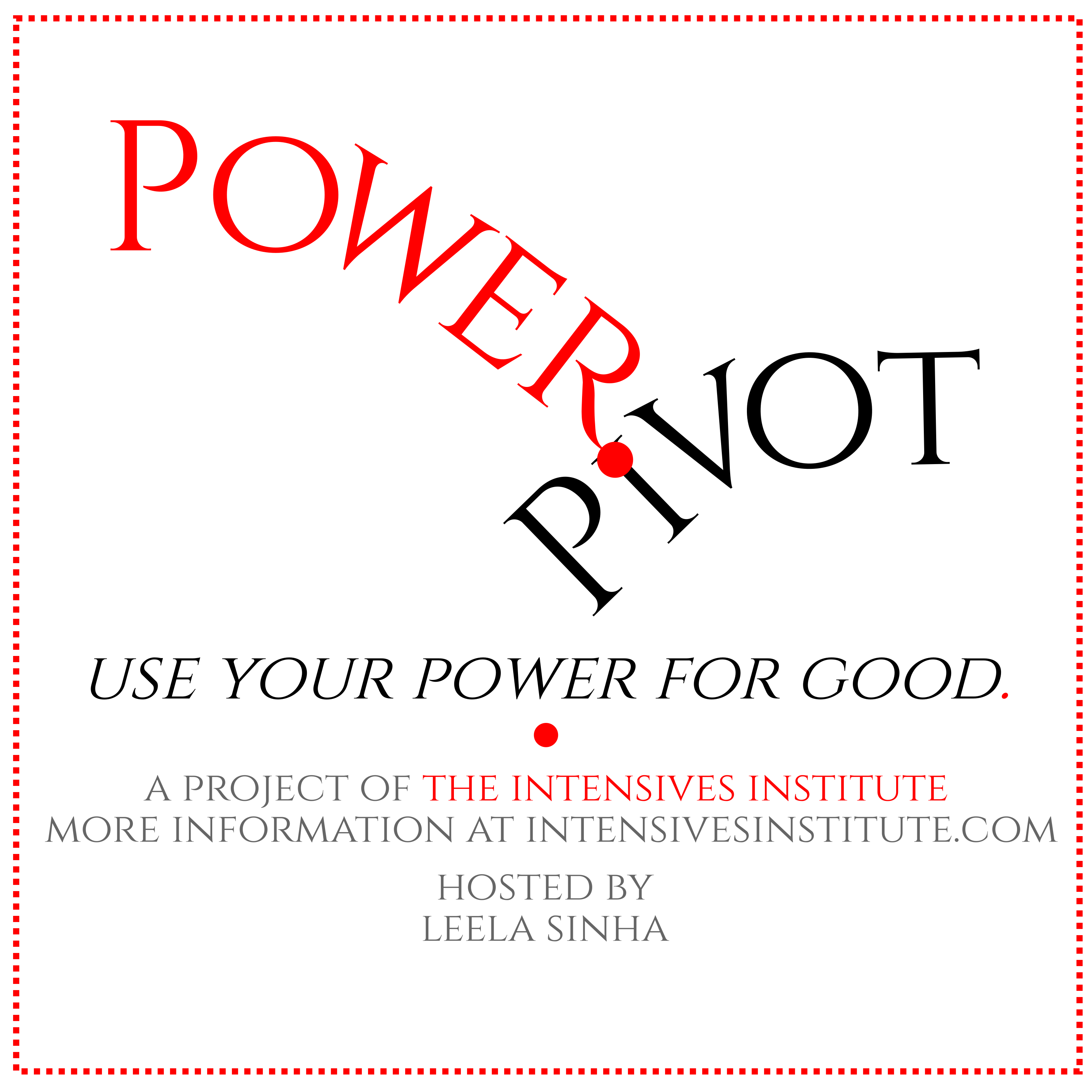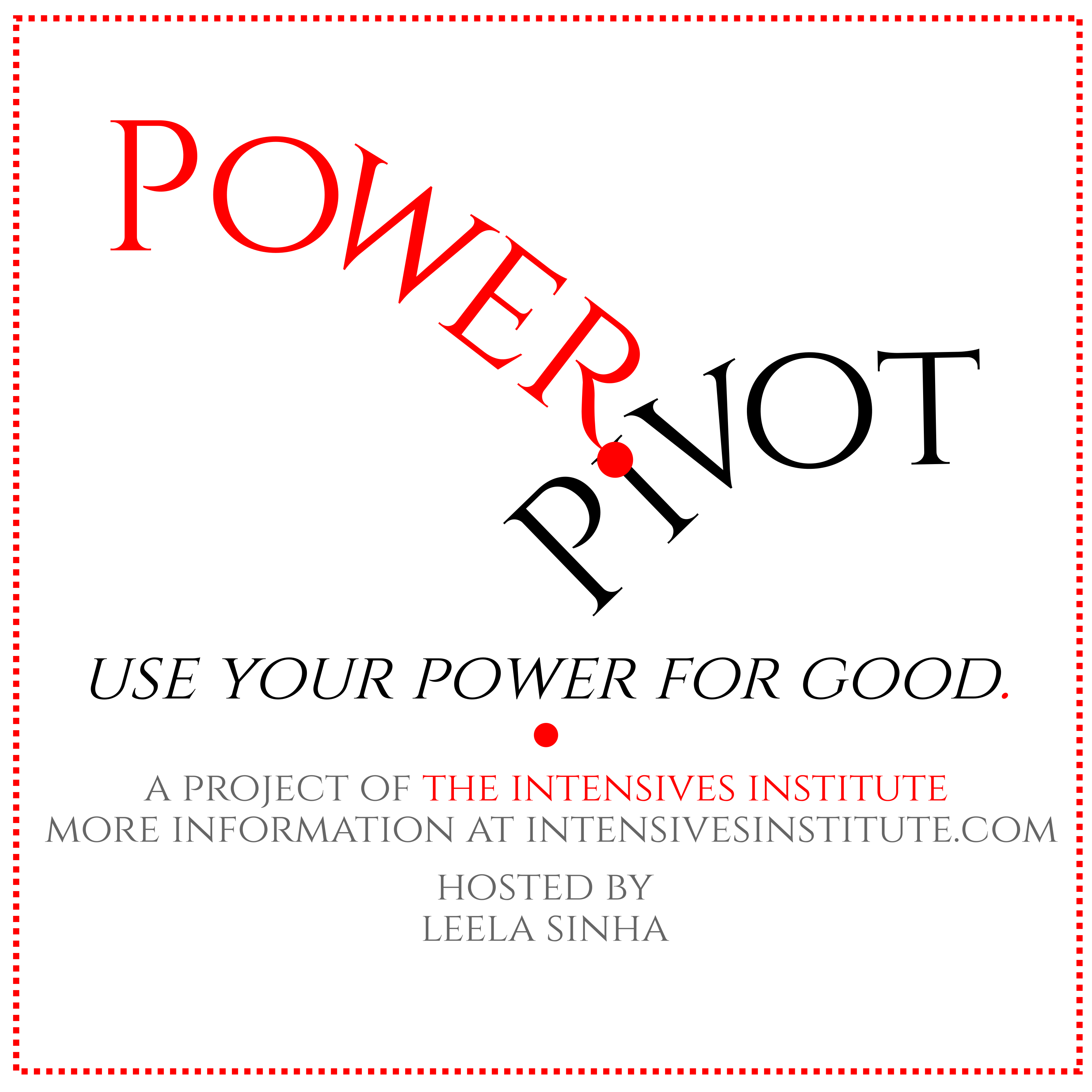Episode 13
You Gotta Order
Starbucks, Redwoods, love, work, community, and everything: the key to being served well is to being known. And rather than take our strengths for granted, we need to we need to play to our strengths and then allow ourselves to be in community, in collaboration, with other people where we need help, where we need support, where we're not as strong.
Find Monica Scantlebury here: https://www.monicamonfre.com/
Transcript
You got to give 'em your order. Before I start, I
Leela Sinha:just want to say that I don't actually drink coffee. And I'm
Leela Sinha:going to talk about ordering at Starbucks. So I'm probably going
Leela Sinha:to sound like a right fool. Because I don't know anything
Leela Sinha:about anything about Starbucks, even the sizes of the cups is
Leela Sinha:confusing.
Leela Sinha:But I do know this, they
Leela Sinha:will customize a coffee order to the end of the
Leela Sinha:earth. And so people walk in there, and they have like
Leela Sinha:their regular order, like, nobody orders, almost nobody
Leela Sinha:orders black coffee anymore. Apparently, we order like
Leela Sinha:half-Caf-mocha-latte-something-something-I don't know. But everybody knows
Leela Sinha:what their order is. Everybody walks in, everybody speaks it
Leela Sinha:fluently. It's like a whole other language in there. And
Leela Sinha:then most of the time, the baristas make the coffee. And
Leela Sinha:the person picks up their order at the end of the counter,
Leela Sinha:because they know that that's how that system works, because
Leela Sinha:it's a whole other world in there.
Leela Sinha:And, and then they drink their coffee and they're happy.
Leela Sinha:And that's why people go to Starbucks because they know that
Leela Sinha:no matter which Starbucks they go to, they'll get basically the
Leela Sinha:same coffee if they give basically the same order.
Leela Sinha:And that basically the same coffee
Leela Sinha:is what they want. They don't want to deal with uncertainty in
Leela Sinha:their caffeine delivery. They like consistency. They like
Leela Sinha:regularity. They like knowing that if it's bad, at least it's
Leela Sinha:bad in the same way that it's always bad. And if it's good,
Leela Sinha:it's good in the same way that it's always good. And it doesn't
Leela Sinha:matter if you're in Kansas or in California.
Leela Sinha:But here's the thing, here's the key to that perfect seamless
Leela Sinha:interstate experience, you got to give them
Leela Sinha:the same order. In fact, you got to give them an order that asks
Leela Sinha:for the thing you want, you got to ask for exactly what you want
Leela Sinha:in the way that you want it. If you want them to foam or not
Leela Sinha:foam or whipped cream or not whipped cream or extra shots or
Leela Sinha:extra flavoring or extra ice or no ice at all. Like you have to
Leela Sinha:ask for the thing the way you want it. And you can ask for it
Leela Sinha:exactly
Leela Sinha:the way you want it. But you do have to ask. And when you ask
Leela Sinha:you're
Leela Sinha:rewarded with exactly the thing you want. And so most people get
Leela Sinha:pretty good at asking for exactly the thing they want in
Leela Sinha:the language that Starbucks uses to understand what all of these
Leela Sinha:complicated requests are.
Leela Sinha:You have to ask. The key to being served well, is being
Leela Sinha:known. The key to
Leela Sinha:being served well is being known. I was recently in a
Leela Sinha:Clubhouse interview with Monica Scantlebury, and she and I were
Leela Sinha:talking about boundaries and leadership. The key to being
Leela Sinha:served
Leela Sinha:well is being known well and whether we like to talk about it
Leela Sinha:or not, when someone is in your employ, there is a way in which
Leela Sinha:they are there to serve you. They are there to meet a need
Leela Sinha:that you have, you are paying them to be in your service for a
Leela Sinha:particular period of time or for a particular task. But they have
Leela Sinha:to know you, they have to know you and the more they know you
Leela Sinha:the better a chance that they'll give you what you want the first
Leela Sinha:time, that they'll anticipate your needs well, that they'll be
Leela Sinha:able to fulfill,
Leela Sinha:above and beyond,
Leela Sinha:above and beyond the basics, above and beyond the letter of
Leela Sinha:the instruction. Because it's one thing to go into a Starbucks
Leela Sinha:where nobody knows you and give your standard order and get your
Leela Sinha:standard coffee. But it's another thing to walk into the
Leela Sinha:Starbucks where you go in every morning
Leela Sinha:at exactly 8:05. And you
Leela Sinha:often end up standing between the same people in line and when
Leela Sinha:you get to the counter,
Leela Sinha:the barista smiles and says "the usual?" and you say "yes, thank
Leela Sinha:you." And you
Leela Sinha:make the tip a little bigger because you like the barista
Leela Sinha:because you like this location because he like the feeling of
Leela Sinha:being known. You didn't have to spit out that long string of
Leela Sinha:adjectives that explained how you wanted your coffee, because
Leela Sinha:they've been making your coffee that way for a long time,
Leela Sinha:and they remember.
Leela Sinha:They already know. They don't just know what those words mean.
Leela Sinha:They know you. And so they can save you all of those words. You
Leela Sinha:don't need those words unless you're doing something different
Leela Sinha:from usual. They can just use what they know to serve you well
Leela Sinha:and then, they put an extra note on the cup because they know
Leela Sinha:your birthday is coming up or something happens and
Leela Sinha:something's not right. And the barista just, you know, slides
Leela Sinha:you a little cookie across the counter as compensation for the
Leela Sinha:trouble because they know you and
Leela Sinha:you know them. When you have someone working for you, the
Leela Sinha:more they know
Leela Sinha:about you, the more they know about how you think and how you
Leela Sinha:operate and what you want, the better a job they can do, of
Leela Sinha:their job, because their job in some ways is to serve you if
Leela Sinha:they're working for you. And so they can know that if you're
Leela Sinha:running more than five minutes late and you haven't texted,
Leela Sinha:you're probably not coming to that meeting, they can ask you,
Leela Sinha:if you're coming to that meeting, they can make sure they
Leela Sinha:have your coffee ready, they can whatever it is that they have
Leela Sinha:learned about you
Leela Sinha:that you need.
Leela Sinha:They can automatically show up to the meeting with the Google
Leela Sinha:Doc for the notes already created and already shared with
Leela Sinha:you, so that you can watch those notes scroll by as they take
Leela Sinha:notes on your conversation, so that you can feel secure knowing
Leela Sinha:that those things have been written down. And also, because
Leela Sinha:they know that you know that reading the words helps to
Leela Sinha:cement them in your brain. And that you don't have to tell them
Leela Sinha:all that every time you tell them that once or they learn it
Leela Sinha:by being in your presence. But the more you can tell them the
Leela Sinha:faster it is, the easier it
Leela Sinha:is. To be served well as to be known well.
Leela Sinha:Does that involve vulnerability? Yeah. To some extent it does. If
Leela Sinha:you have an assistant, they probably know more of your flaws
Leela Sinha:than almost anybody else. Does that involve risk? Sure.
Leela Sinha:big risk, big reward. But you
Leela Sinha:gotta tell them. You got to tell them what you want, you got to
Leela Sinha:tell them what you need, you got to be honest about all the
Leela Sinha:things that you do well, and all the things that you don't do
Leela Sinha:well, and the reason that you really needed to hire them in
Leela Sinha:the first place. And you gotta be honest about what makes you
Leela Sinha:feel good and what doesn't, and how they can help you feel
Leela Sinha:better. It still counts even if you have to ask for it. In
Leela Sinha:relationships, I know a lot of people think that it doesn't
Leela Sinha:count if they have to ask to be told that someone loves them.
Leela Sinha:Because if it didn't arise spontaneously out of their
Leela Sinha:partner's lips, then it doesn't, doesn't feel real, it doesn't
Leela Sinha:feel genuine. But what I know is that if I need to hear that
Leela Sinha:someone loves me, and I don't ask,
Leela Sinha:they might know me well enough to know to say it anyway. But
Leela Sinha:they might be distracted, they might be tired, they might be
Leela Sinha:having a bad day. They might just feel it so strongly that
Leela Sinha:they feel like they don't have to say it. Not consciously but
Leela Sinha:unconsciously, it might just feel like a thing that exudes
Leela Sinha:out of every pore from all of the things that they do for me
Leela Sinha:and all the ways that they are with me. And
Leela Sinha:it might just be me that needs the words. But the only way I'm
Leela Sinha:going to get those words is to ask.
Leela Sinha:And the key to all of this stuff, at the bottom of the
Leela Sinha:bottom of all of it, is that you have to know yourself well
Leela Sinha:enough to know what to ask for. You have to know what you need.
Leela Sinha:You need to know what you're good at and where you always
Leela Sinha:break down. You need to know what you love and what you
Leela Sinha:resist even though you're perfectly competent at it. You
Leela Sinha:need to know what's getting in the way of the next thing. Not
Leela Sinha:so that you can overcome it all and become a superhuman person,
Leela Sinha:which is what we're mostly taught in school is that you
Leela Sinha:have to work on your weak spots and take your strong spots for
Leela Sinha:granted. But in fact, I think it's the reverse we need to play
Leela Sinha:to our strengths.
Leela Sinha:And then allow
Leela Sinha:ourselves to be in community, in collaboration, with other people
Leela Sinha:where we need help, where we need support, where we're not as
Leela Sinha:strong. Recently, a redwood tree in my neighborhood fell over,
Leela Sinha:there was a huge windstorm. And this enormous tree just toppled
Leela Sinha:into the park. At first everyone was really surprised, in a good
Leela Sinha:way, because it had toppled into the park and not toward the
Leela Sinha:street. Not toward any of the many houses that surrounded it.
Leela Sinha:It was right on the corner of the park right at an
Leela Sinha:intersection. It could have crushed anything and it didn't.
Leela Sinha:It sheared all the branches off of another tree in the park. But
Leela Sinha:it fell into a completely empty field.
Leela Sinha:And it wasn't
Leela Sinha:until somebody thought about the root structures of redwoods,
Leela Sinha:that they figured out what happened. See the street and the
Leela Sinha:sidewalk, and the curb, and a little retaining wall, had all
Leela Sinha:been put in at that corner of the park. And when they did
Leela Sinha:that, they cut the very shallow root structure of this
Leela Sinha:enormously tall tree on two sides, but only on two sides.
Leela Sinha:And those two sides were the sides that faced the street and
Leela Sinha:so when it fell, it was still attached
Leela Sinha:in the direction of the park, so that's toward the park is where
Leela Sinha:it fell. Because the roots that were no longer there to hold it
Leela Sinha:up, were on the street side.
Leela Sinha:But if you go to look at the Redwoods in their natural
Leela Sinha:habitat,
Leela Sinha:they're never far from each other.
Leela Sinha:redwoods are a forest, the living being, the organism, is
Leela Sinha:the forest itself.
Leela Sinha:Each individual tree is
Leela Sinha:a fruiting body almost like a mushroom with a mycelial network
Leela Sinha:under it. Each individual tree is its own thing, but its own
Leela Sinha:thing in the context of a community. And so these shallow
Leela Sinha:roots, because these enormously tall trees only have root
Leela Sinha:systems that are six or seven feet deep. These shallow root
Leela Sinha:systems work because they work in a network, because they are
Leela Sinha:interlaced and interlocked. And so one tree blowing in a strong
Leela Sinha:wind shifts back and forth. And if you're standing in the
Leela Sinha:forest, when that happens, you can feel the ground ripple under
Leela Sinha:your feet as the shock and the stress and the strain spread out
Leela Sinha:through the entire network of trees, through the roots under
Leela Sinha:your feet. Through the whole living body. We need to be in
Leela Sinha:community where we're weakest. It's only when we're not in
Leela Sinha:community that we fall down. And as leaders, that's more true,
Leela Sinha:not less. Thanks for tuning in. I'll see you next time.


